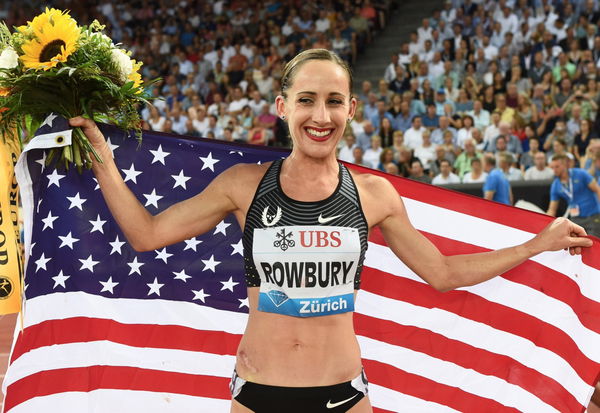

‘Success isn’t always immediate, but it’s always worth the wait.’ For Shannon Rowbury, these words hit home more than ever. After 12 long years of wondering what might have been, that moment of triumph she’d been chasing is finally within reach. Back in the 2012 London Olympics, Shannon finished sixth in the 1500m final, just shy of a medal. She’d always felt like she deserved more, but for over a decade, the podium had slipped through her fingers. Now, because of a major turn of events in Track and field, she’s about to claim the bronze that’s been hers all along.
It all started when Russian runner Tatyana Tomashova’s name was in the news again—but not for any good reason. Tomashova, who had originally finished fourth, was awarded silver after two athletes in front of her were disqualified for doping. However, this week, the Athletics Integrity Unit (AIU) confirmed that Tomashova was banned for 10 years for violating anti-doping rules. As a result, her silver medal was stripped, and that opened the door for Rowbury to step into the spotlight.
Shannon must have felt like she was, in a dream watching everything play out before her eyes. After finishing sixth, she had always held onto the hope that someday she would receive the bronze medal that was rightfully hers. It seemed like an outcome. Now here she was, receiving the acknowledgment she had earned, over a decade ago in Track and Field. The tale didn’t end there. With Tomashovas disqualification the whole medal rankings from that race underwent a change.
ADVERTISEMENT
Article continues below this ad
That race was such a joke. So obvious how many of them were clear dopers
— Quinn Chasan (@QuinnChasan) November 19, 2024
The 2012 final proved to be one of the most talked about races, in memory with Tomashova being the fifth athlete from that event to receive a retrospective penalty sanction resulting in a reshuffling of the rankings for many athletes including Maryam Yusuf Jamal being upgraded to gold from originally finishing third place and Ethiopia’s Abeba Aregawi moving up to silver following Tomashovas disqualification; meanwhile Rowbury who had initially placed sixth was officially honored with the bronze medal instead. An awaited moment, for Shannon and all those supporting her; a tale of perseverance reaching its rightful conclusion at last. After a wait that tested their patience to the limit and pushed their excitement to heights, track and field enthusiasts finally got the payoff they were eagerly anticipating.
Fans go wild over the shocking truth of the 2012 doping fallout!
One Track and field fan summed it up perfectly, saying, “That race was such a joke. So obvious how many of them were clear dopers.” True words indeed. The 1500-meter final, at the 2012 London Olympics is now infamous for being one of the tainted races in Olympic history. Tatyana Tomashova had to surrender her silver medal due to a violation; however, she was not alone in this transgression. Both Asli Cekir Alptekin and Gamze Bulut from Turkey faced bans for blood doping after securing positions, in the race.
What’s your perspective on:
Is the 2012 Olympics 1500m final the most tainted race in history?
Have an interesting take?
The controversy didn’t stop there! Natallia Kareiva, from Belarus, and Yekaterina Kostetskaya from Russia faced doping charges after finishing seventh and ninth in the race—resulting in their ban from the sport altogether. The doping incidents during that competition caused an uproar and forced a complete reevaluation of the final rankings of the athletes involved in what is now regarded as one of the most disputed and tarnished track and field events, in Olympic memory.

One fan summed it up perfectly: “The London 2012 women’s 1500m final race was wild. If I remember correctly, six or seven of the finishers have been either banned or disqualified because of doping. Unbelievable.” Another fan recalled, “I was fortunate enough to get a ticket as a kid to watch the London 2012 Olympics. We went the night of the women’s 1500m, and it’s absolutely crazy to think that five of the 12 finishers have been disqualified for doping.”
Someone else chimed in, saying, “LOL, London 2012—remember that d— -fueled Olympics? Five of the 13 finalists in the women’s 1500m have now been retroactively DQ’ed for doping.” And another fan bluntly added, “That race was such a joke. So obvious how many of them were clear dopers.” The more we look back at that race, the more it becomes clear just how tainted it was, with the scandal unfolding long after the event.
One Track and field fan put it this way: “Imagine for a moment that you are taking d—. You win a silver medal at the Olympics. You fulfill your lifelong dream. And 12 (twelve) years later they come and tell you.” It’s a tough pill to swallow, but it’s the reality for athletes caught up in doping scandals. As much as it might sting, the truth is the truth—and there’s no escaping it, no matter how much time has passed.
ADVERTISEMENT
Article continues below this ad

This is exactly why anti-doping measures at the Paris 2024 Olympics were tighter than ever. From the very start, when the Olympic Village opened up until the end of the Games. The International Olympic Committee (IOC) ensured doping testing throughout various stages of the competition. Not only after track and field events but also during training sessions and, in athletes’ everyday activities.
ADVERTISEMENT
Article continues below this ad
Athletes had to submit detailed whereabouts information, so they could be found for random d— tests anytime, anywhere. Samples—urine, blood, or dried blood spots—were collected by accredited officials and analyzed in WADA-approved labs. And the Athlete Biological Passport (ABP) was still in full effect, tracking long-term biomarkers to spot any signs of doping over time. All of this was in place to keep the competition clean and focused on the athletes’ performances, without the shadow of cheating hanging over the Games.
Better late than never, right? Shannon Rowbury’s bronze is proof that persistence pays off, and the 2012 1500m final just goes to show that in Track and field, justice always catches up, even if it takes a while.
ADVERTISEMENT
ADVERTISEMENT
ADVERTISEMENT
ADVERTISEMENT


Is the 2012 Olympics 1500m final the most tainted race in history?